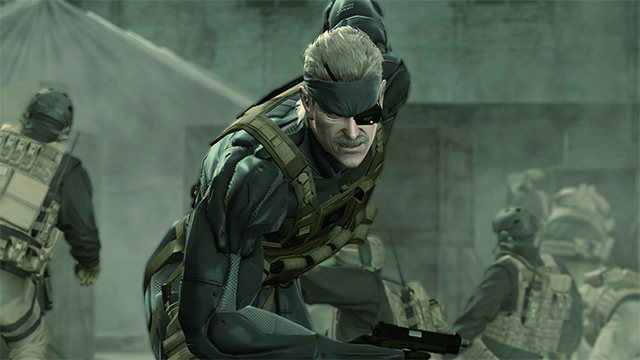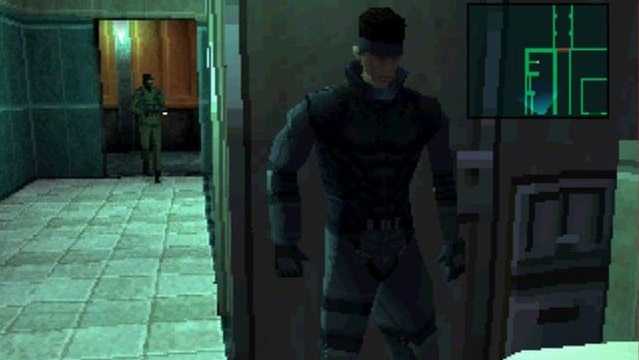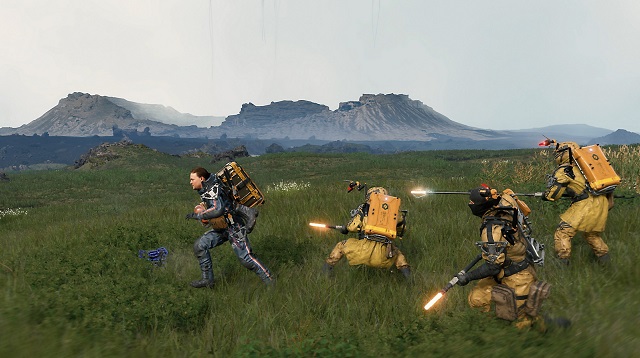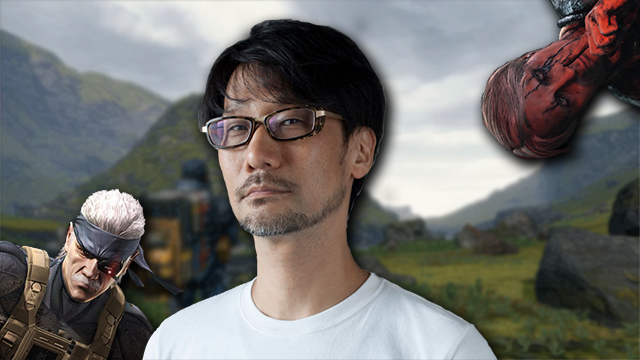It’s something we’ve all seen at this point: the pomp and circumstance, the pyro and ballyhoo, all for one rockstar developer. Hideo Kojima wowed people once again with a trailer that Twitter can’t stop talking about. We’ve seen throat babies, shadow monsters, space whales; all the nonsense you can handle. With the premiere of Kojima’s Death Stranding, we lose the Metal Gear name, the thing many held onto throughout this journey. But the question must be asked: are we excited to play this game as it has been shown off or are people just hungry for whatever Kojima coughs up no matter what it is? Because while many of his games are beloved, they seem be hard to separate from the circus surrounding it and Death Stranding may be his biggest, most complicated circus yet. And as opposed to ending vampires with nanomachines and hypnosis, that’s where Death Stranding is starting.
The weird, on-the-nose world of Death Stranding
So, beyond all the celebrity cameos, what do we know about Death Stranding? Thanks to previews coming out of Gamescom, we have a pretty good idea of the narrative thrust, although it’s all secondhand. You play as Norman Reedus’ character, Sam Porter Bridges. You are a courier activating technology across America and keeping the lines of communication open. It’s a game about solitary wondering, as we saw in the few gameplay snippets shared before the conference. You’re fighting a metaphysical force, but indirectly. As we see in one trailer, direct interaction only leads to a swift death via rapid aging.
A pretty cut and dried premise once you contextualize all the weird gadgets and goo monsters we’ve seen in the trailers. However, even those unusual elements click together well, especially considering how on-the-nose Kojima can be with his character names. Sam Bridges is building bridges in a fractured version of our nation. It makes about as much sense as anything else. Still, discounting all the trailers and looking at that premise, there are maybe a handful of developers that could tackle that big topic with grace and Kojima and his team aren’t among them, given how heavy-handed he can be. Sam Bridges.
Snaking through the past

That’s not to say that it’s hard to trust Kojima to put out something interesting. It’s just not clear if the actual game parts will end up as the main narrative of the story surrounding the game. It has so much competition for the spotlight as it has to stand out among the Silent Hills debacle and Kojima’s exit from Konami. It also has to stand above huge celebrity cameos and the insane little inclusions that have only gotten more out in the open as Kojima’s career continues. We need more games about wandering, playing characters that aren’t soldiers of fortune in a warzone but this isn’t quite being sold as that.
Despite some inconsistencies, his games have always been sold as both story and gameplay experiences. Looking back at his career, his last spotless experience probably dates back to the PlayStation 2. Metal Gear Solid 3: Snake Eater had plenty of innovative mechanics to advance stealth gameplay. Kojima threw out ideas that we still haven’t fully explored more than a decade after Big Boss’ jungle adventure. Of course, that game also continued the trends of Metal Gear Solid 2 by putting players into the shoes of a character that wasn’t Solid Snake. The original protagonist wouldn’t return to the series until the next game which is where the whole franchise started to unravel — even if those later titles are highly regarded.
Both Guns of the Patriots and Metal Gear Solid 5 have incredibly strong moments and mechanics but suffer from inconsistencies when taken as a whole. They shift to more of an action focus, with 5 hailed as one of the best systems-driven stealth games of all time. However, in the story department, Kojima seemed to be pulling strings together from past games in order to stitch together something that is overly ambitious and a bit convoluted. It makes for an uninteresting jumble of character connections that most players couldn’t care less about when they’re so intricately and haphazardly compiled. In a way, these two games share a lot in common with why the Star Wars prequels fail on such a fundamental level. The story doesn’t advance the lore; it complicates the lore. And all the great action in the world can’t distract from that.
A strong man doesn’t need to read the future

Kojima is continuing in this direction even when given a fresh start. It’s the same mindset that made him replace Snake’s signature voice with an actor that cost so much that they couldn’t secure a full performance. Big Boss doesn’t talk much anyway but it still felt incomplete. There are plenty of beautiful games that come from minds breaking out of the AAA space; ideas stifled by bigger companies finally taking shape into amazing prospects. Death Stranding just doesn’t seem like that kind of game because it seems to be starting complicated instead of with simple ideas.
Instead of using complicated story reasons to resurrect Volgin with new abilities in MGS5, Kojima is using complicated story reasons to inject his own struggles in as thinly veiled metaphor to drive the plot forward in Death Stranding. This is a path many artists take, but it’s not what Kojima originally brought to the dance. The original Metal Gear Solid with an action/spy pastiche, with the developer’s quirks serving as the perfect seasoning. People came to that game because it was innovating in both gameplay and storytelling. It was cinematic when most games were still barely direct-to-video budget films. Kojima continues to innovate in terms of gameplay, as we’ve seen in every other Metal Gear he’s done, but his stories get further and further away from those simplistic yet effective beginnings as time moves on. Metal Gear Solid 4 and 5 were complicated but they were at the end of their series. Death Stranding seems to be starting from that point, which isn’t the most promising sign.
War has changed in Death Stranding

So are people truly clamoring to see the story of Sam Bridges and his baby pod trot across America? Or are they instead plowing through that tale to get to moments equal to MGS4‘s inexplicable soda monkey? If it really is the latter, that’s a shame, both for Kojima as a creator and for the AAA space. Before all the nonsense, the first two Metal Gear Solid games balanced strange characters with storytelling that captured your attention. Non-MGS titles like Snatcher showed a variety to his work outside of wacky hijinx. The man has cried out for a break from Metal Gear forever. Despite that, Death Stranding seemingly slots pretty well into that franchise given how the weird stuff is a natural continuation of where Metal Gear left off.
More importantly, with Death Stranding revealed as a high profile release with a focus on nonviolence, can it be a trendsetter? Will Kojima sneak these mechanics into player’s hands with his weirdness as a cover story? Will people take a game like this seriously, or will they take it as a wild trip with all sorts of trippy stuff because they just want the spectacle of something big and bizarre? Its insane happenings are likable in the same way as professional wrestling. While weird is good in most situations, full weird has never been the best route for Kojima when compared to his other works and that’s why it is a little disappointing to see Death Stranding start there. It’s hard to not be excited for Death Stranding because it does look interesting, but hopefully it can blossom beyond just “the next Kojima game.” Because the last few times that has been said, it has come with an uncomfortable amount of baggage; an amount of baggage that Sam Bridges’ huge backpack probably might not be able to carry.







